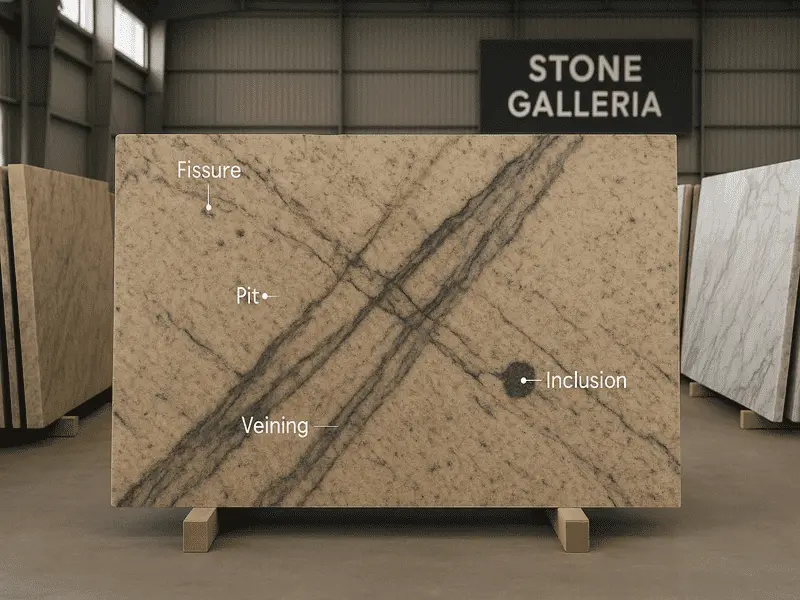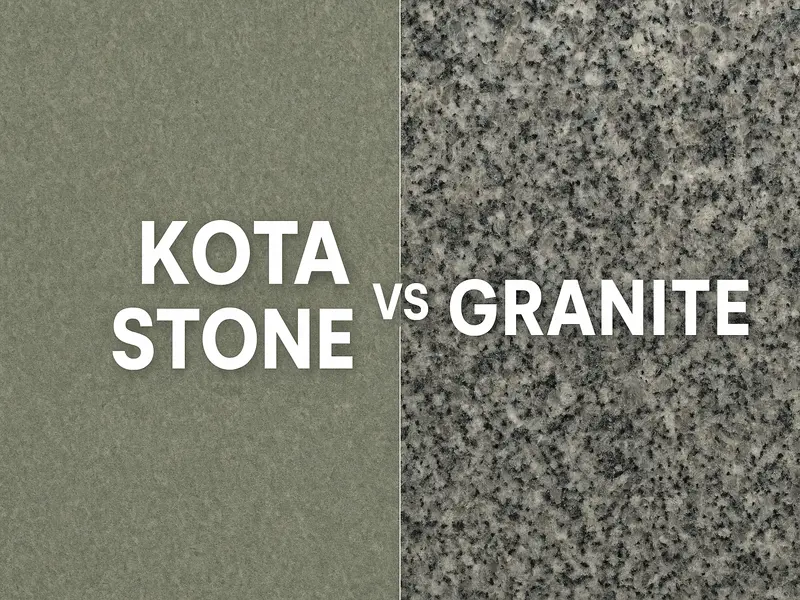Picture this: You’re standing in a dazzling showroom, surrounded by granite slabs. Your heart races with excitement, and your mind swirls with possibilities. You’re here to make a decision that will define the essence of your next grand project. But then, you face the ultimate dilemma: Honed vs. Polished granite?
For project managers, interior designers, B2B clients, dealers, homeowners, and wholesalers alike, this choice is more than just a surface-level decision. Honed granite, with its smooth, matte finish, exudes subtle elegance and charm. It’s like a gentle caress, inviting appreciation of the stone’s natural beauty. On the other hand, Polished granite dazzles with its mirror-like shine, radiating opulence and sophistication.
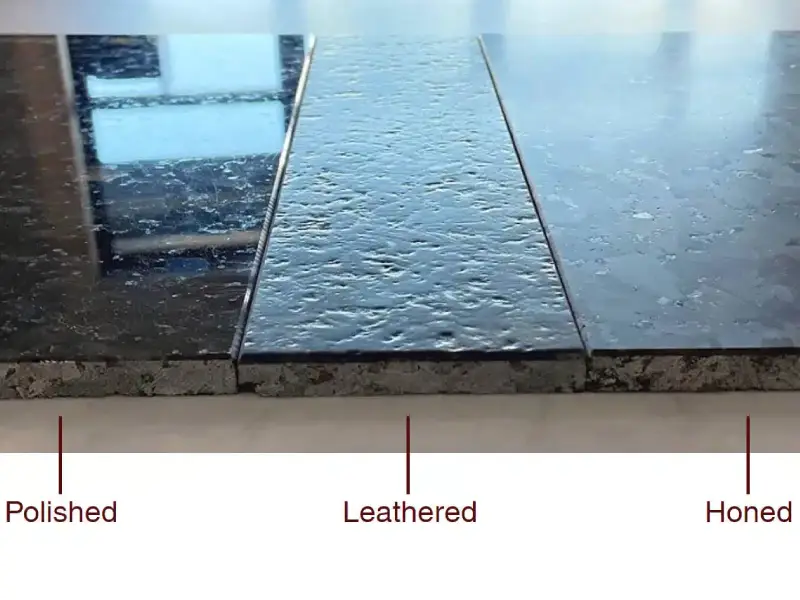
The conflict arises as you weigh the pros and cons of each finish. Honed granite offers a slip-resistant surface, perfect for high-traffic areas, but can show stains more easily. Polished granite, while resistant to stains and easier to clean, can be slippery and show scratches more prominently. Understanding the differences in Honed vs. Polished granite is super important for making the perfect choice for your project.
What’s Honed Granite?
A granite slab with a honed finish exhibits a subtle, satin appearance that lacks shine, preserving the stone’s original color and depth. Its velvety texture is often described as understated or relaxed. Honed surfaces can lighten or mute granite tones, masking natural imperfections effectively due to their non-reflective nature.
The difference between honed and polished granite in terms of process lies in the stages of granite finishing. Honed granite is achieved earlier in the overall polishing process. It involves stopping before the final stages of polishing, which use finer polishing pads to create a mirror-like finish. In contrast, honed granite does not go through these final stages, resulting in a matte or satin finish.
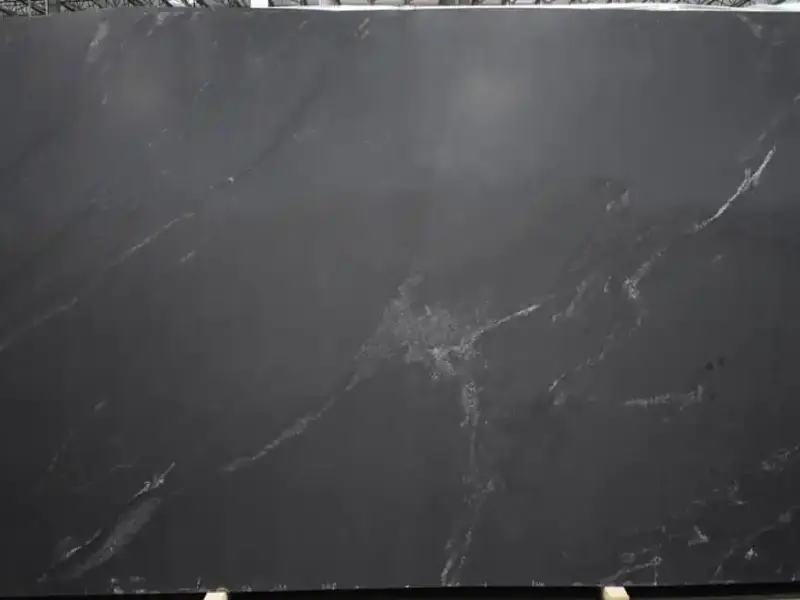
What’s Polished Granite?
Polished granite offers a stark contrast to honed finishes. Its glossy, reflective surface enhances the stone’s darker tones, making it a standout choice, particularly popularized in home décor since the 80s. This finish remains highly sought-after for its ability to create striking visual contrasts, especially when paired with kitchen cabinets. Polished granite countertops become focal points in kitchens, elevating the overall aesthetic with their brilliant shine and luxurious appeal.
ALSO READ | How is Granite Polished? Techniques Used in Factories and On-Site Restoration
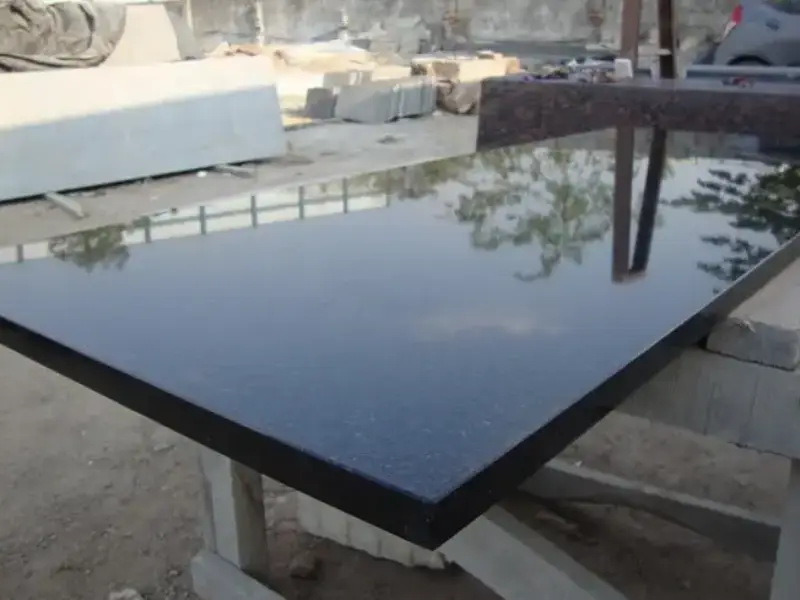
DIFFERENCE BETWEEN HONED AND POLISHED GRANITE
The difference between honed and polished granite lies in their finishing processes rather than the inherent qualities of the stone. Both finishes start with polishing the rough side of the granite using coarse, abrasive pads that grind and buff the surface. A honed finish is achieved when the polishing stops before the stone becomes shiny, resulting in a smooth yet matte appearance. In contrast, polished granite undergoes additional fine grinding and buffing to achieve a glossy, reflective surface that enhances the stone’s natural colors and patterns.
Understanding these processes helps in choosing the right granite finish based on personal preferences and the desired aesthetic for your space. Both honed and polished granite finishes require sealing to maintain their appearance and durability over time.
ALSO READ | Selecting the Perfect Granite Finish Types for Your Construction Project
Hones VS. Polished Granite: What’s The Look?
As mentioned earlier, there is a significant difference in appearance between honed and polished granite. Both finishes are available in various colors. Polished granite is typically favored for its widely recognized high-gloss finish, popular in interior applications. In contrast, the honed look has become increasingly popular, particularly among those who appreciate its subtle texture and prefer darker interior aesthetics.
Beyond the matte and shiny difference, there are additional distinctions in the appearance of honed and polished granite
Honed Granite:
- Look: Has a soft, matte finish that is non-reflective.
- Feel: Smooth to the touch with a velvety texture.
- Appearance: Colors appear lighter or muted compared to polished granite.
- Characteristics: Conceals natural imperfections more effectively.
Polished Granite:
- Look: Offers a glossy, reflective surface that enhances the stone’s natural colors and patterns.
- Feel: Very smooth, almost glass-like to the touch.
- Appearance: Darker tones are accentuated, creating a vibrant and luxurious look.
- Characteristics: Stands out as a focal point in kitchens and bathrooms due to its shine and visual impact.
Choosing between honed and polished granite depends on your preference for either a subtle, understated look (honed) or a bold, glossy finish that highlights the stone’s natural beauty (polished).
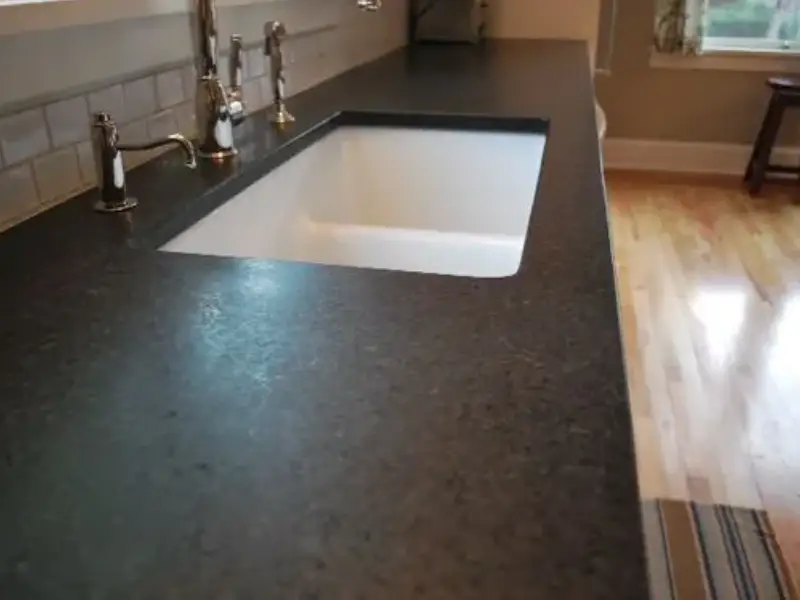
What Factors Influence the Decision Between Honed and Polished Granite?
Based on intended use and design preferences, the choice between honed and polished granite can be tailored to specific needs:
Application Area:
Polished Granite: Ideal for high-traffic areas like kitchen countertops due to its durability and ease of maintenance. It requires less meticulous upkeep, making it suitable for busy households with children or frequent cooking needs.
Honed Granite: Requires a vigilant cleaning regimen and regular sealing but offers a matte finish that can be preferred in areas where a softer aesthetic is desired. It’s versatile but demands more upkeep to maintain its appearance over time.
Looks:
Polished Granite: Known for its high-gloss sophistication and ability to reflect light, polished granite is often chosen to create a sleek, luxurious atmosphere in interiors. It enhances the natural colors of the stone and adds a vibrant focal point to living spaces.
Honed Granite: Offers an understated, contemporary look that aligns with modern design trends favoring neutral tones and natural materials. Its matte finish provides a subdued elegance that blends well with eco-friendly and minimalist aesthetics.
Choosing between honed and polished granite ultimately depends on balancing practical considerations like maintenance with aesthetic preferences tailored to enhance your living space or commercial environment.
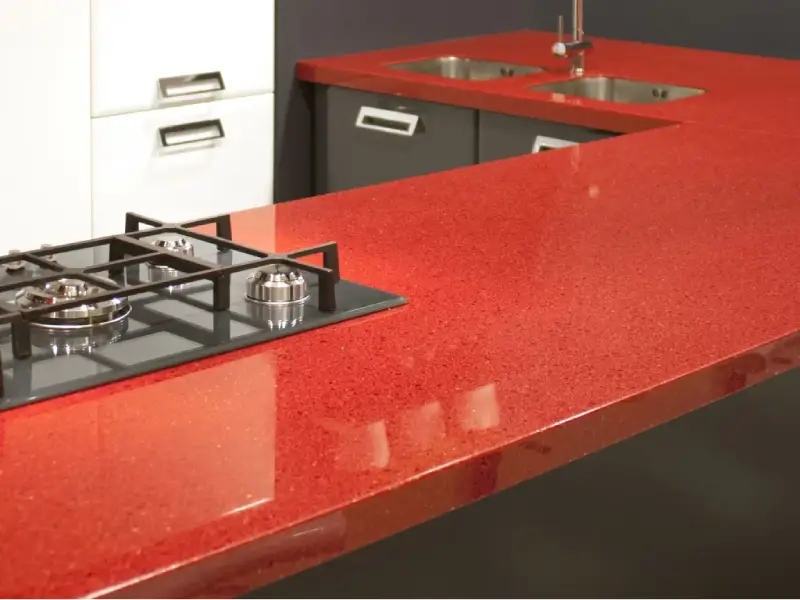
Honed vs. Polished Granite: Key Comparisons
Porosity:
-
- Honed Granite: Generally less porous than polished granite due to its matte finish, which can help resist liquid absorption to some extent.
- Polished Granite: More porous than honed granite because the polishing process opens up the stone’s pores, making it more susceptible to staining if not properly sealed.
ALSO READ | Is Granite Porous? or Non-porous or How Porous Is it?
Stain Resistance:
-
- Honed Granite: Offers good stain resistance, but may require more frequent sealing to maintain its protection against stains, especially in high-traffic areas.
- Polished Granite: Initially less stain-resistant due to its higher porosity. However, once properly sealed, it can resist stains effectively, particularly in kitchens and bathrooms.
ALSO READ | Does Granite Stain? Understanding the Risks, Prevention & Solution
Heat Resistance:
-
- Honed Granite: Generally has good heat resistance and can withstand hot pots and pans placed directly on its surface without damage.
- Polished Granite: Similar heat resistance to honed granite, making it suitable for kitchen countertops where heat exposure is common.
ALSO READ | The Heat Resistance of Granite: Essential Facts
Scratch Resistance:
-
- Honed Granite: Shows scratches less prominently due to its matte surface, which can mask minor imperfections more effectively.
- Polished Granite: May show scratches more visibly because its glossy surface reflects light and emphasizes any marks or abrasions. However, both types are quite durable against everyday wear.
Sealing Requirement:
- Honed Granite: Typically requires regular sealing to maintain its matte finish and protect against stains. Frequency of sealing depends on usage and exposure.
- Polished Granite: Also requires sealing to fill its pores and enhance its stain resistance. It generally needs sealing less frequently compared to honed granite due to its smoother surface.
Overall Durability:
- Both honed and polished granite are highly durable materials suitable for various applications in homes and commercial settings.
- Honed Granite: Offers a softer appearance but requires more diligent maintenance to preserve its aesthetic and protective properties.
- Polished Granite: Provides a high-gloss, luxurious appearance that enhances the stone’s natural beauty, requiring less maintenance over time once properly sealed.
Honed vs. Polished Granite: Understanding the Price Difference
The price difference between honed and polished granite is typically influenced by several factors. Polished granite tends to be more expensive than honed granite primarily due to the additional labor, materials, and machining processes required to achieve its glossy, reflective surface. Honed granite, with its matte finish, generally requires less processing and polishing, which can contribute to a lower cost in some cases.
Moreover, polished granite is often more readily available and popular in the market, which can affect its pricing. On the other hand, honed granite may need to be specially ordered, leading to potentially higher costs due to customization and procurement logistics.
Overall, while the price difference between honed and polished granite is minimal, it can vary depending on the specific type of granite, market conditions, and supplier pricing policies. It’s advisable to consult with suppliers or contractors to get precise pricing details based on your location and the particular granite finish you prefer.
ALSO READ | Is Granite Price Everything While Selecting a B2B Granite Supplier?
Honed Vs. Polished: Who is the Winner?
So, honed or polished granite? There isn’t a clear-cut answer – both finishes offer distinct benefits and drawbacks. The best choice depends on your personal preferences and the specific design and ambiance you aim to create in your space.
Honed granite offers a subtle, matte finish that suits modern design trends favoring understated elegance and natural tones. It requires diligent maintenance but provides a slip-resistant surface ideal for areas where a softer aesthetic is desired. On the other hand, polished granite dazzles with its high-gloss shine, enhancing the stone’s natural colors and making it a focal point in luxurious interiors. While it requires less frequent sealing and is more stain-resistant once treated, it can show scratches more prominently.
For project managers, interior designers, homeowners, and wholesalers alike, understanding these distinctions is crucial for choosing the right granite finish tailored to specific project needs. Whether creating a sophisticated kitchen centerpiece or designing a serene bathroom retreat, honed and polished granite each offer unique advantages that can elevate any space with timeless beauty and durability. By weighing these factors and consulting with suppliers on pricing and maintenance requirements, you can confidently select the ideal granite finish to enhance your next grand project.
No matter your choice, whether honed or polished granite, you are selecting a superior natural stone that guarantees durability and longevity.
Stone Galleria
Discover a diverse selection of granite at Stone Galleria, where we specialize in processing and supplying premium granite slabs and tiles. Whether you’re deliberating between polished granite or honed finish granite or unsure about the ideal color palette for your project, our experts are here to assist. Contact us today for personalized guidance and find the perfect granite solution to complement your decor vision.


 Fact Checked
Fact Checked





